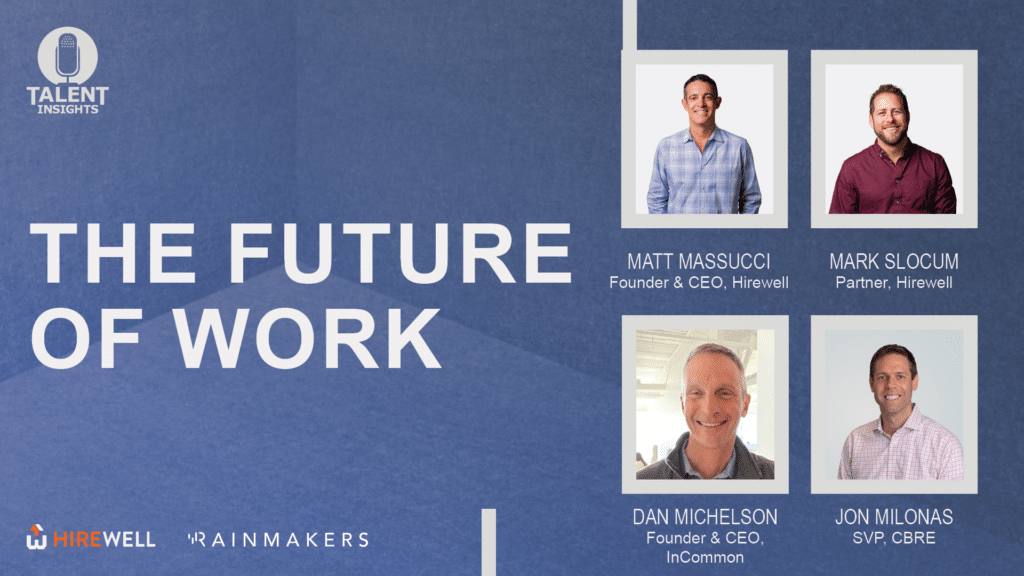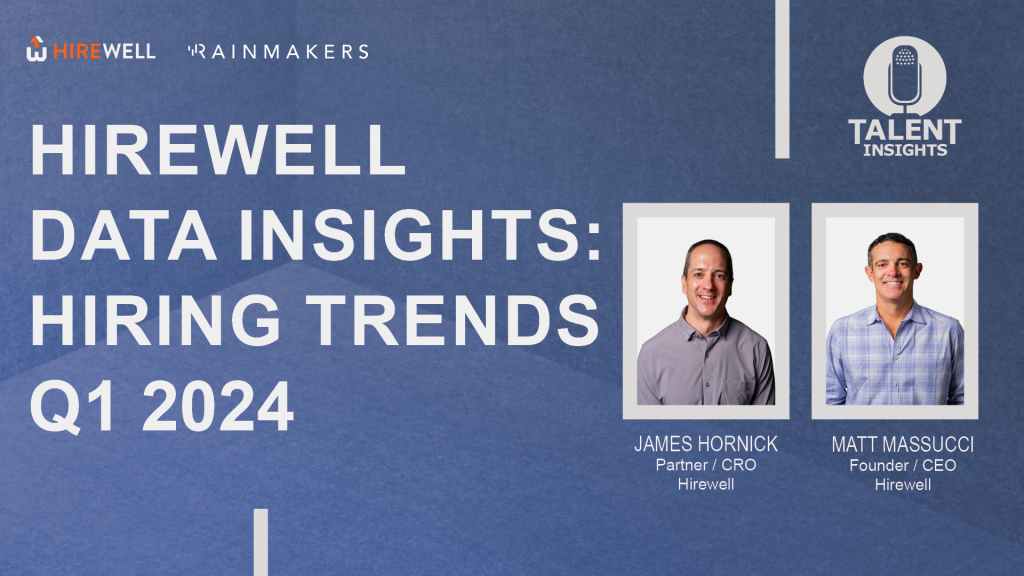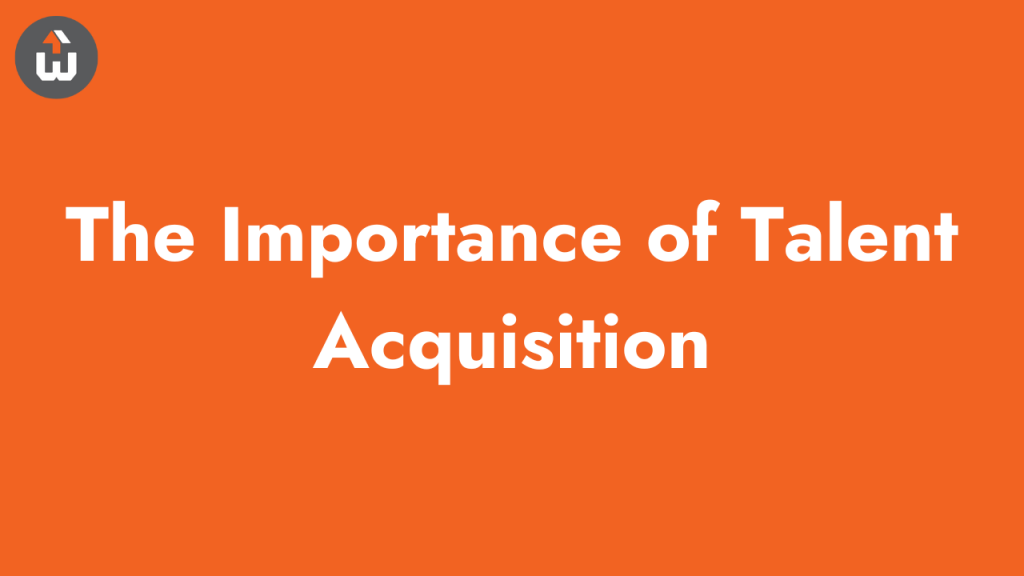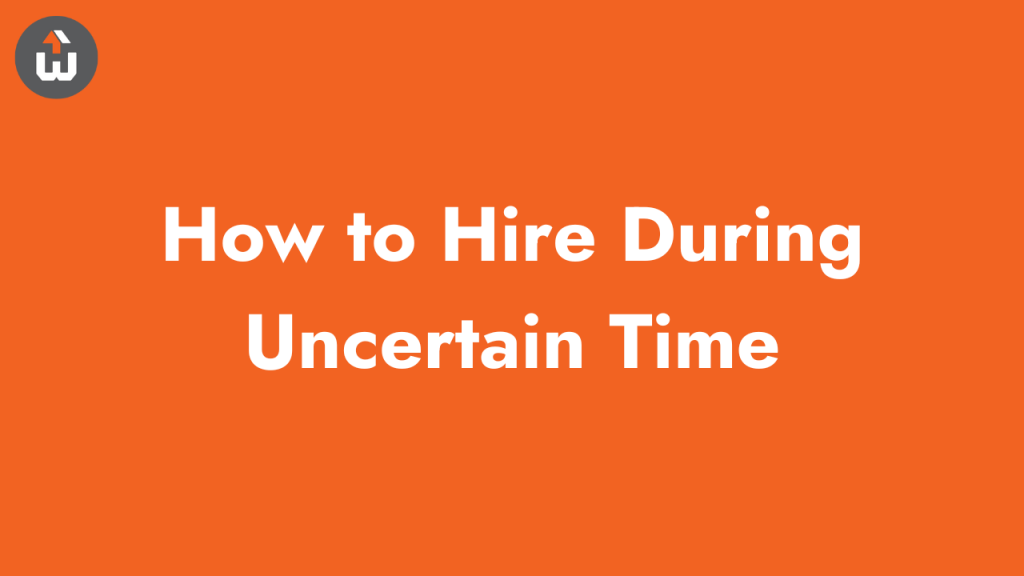Welcome to the Hirewell recruiting insights podcast. I’m your host James Hornick partner at Hirewell, with me is a very special guest. The former podcast host here at hire well, who I successfully usurped is that the word? Cool. Our, fearless leader, the CEO of a Hirewell Matt Massucci. Hi, thanks for having me excited to be here.
So, it’s the, it’s the last cast we’re gonna do this year? Both podcast and LinkedIn live. So under the year’s winding down for everyone, we’ve actually thought it’d be a kind of interesting. I didn’t even realize the decade was ending until like you mentioned it, time flies. We thought one interesting idea would be to talk about really what’s changed in both the industry over the last 10 years or so
as well as Hirewell, because we’ve grown a ton and we don’t talk about ourselves as a whole lot on these LinkedIn live podcasts but I think in the context of what’s happening in the market and how the industry has changed a lot some of the things that we’ve done as well as some things we’ve seen it could be interesting insights for people kind of within the industry within HR and whatnot.
So I think the thing we were talking about is you really have to really get the full effect you kind of have to cheat and go back like another year, because I think they’re really really it’s like that 2008, 2009 timeframe to now, because I do think that the crash and how companies in the hiring and how everything kind of bottomed out really did a lot to change about the industry and kind of how we think about things.
But, you have a better memory than I do. Despite being several years older. I mean what’s I mean, what’s your take, like how do you think that that time period kind of really affected how you saw the industry? So that’s a good question, you know, for people who maybe weren’t in the workforce in the 2008, 2009 a great recession.
It was you know, it was fairly rough for people in just about any space but in anything as cyclical as recruiting and staffing it was, you know quite an event. So I was using kind of all the information we have data to look at sort of what we were doing at the time how large we were.
I think you know we were never terribly large in that past decade. I think we peaked it 12 or 13 people. I think we got a smallest six or seven in a, you know, early 2009 but you know, as we, as that year progressed, we realized the world wasn’t going to end people were going to start hiring the banks
weren’t all gonna fail we use that as an opportunity to really start to grow rapidly and to start kind of what I consider the second phase of our company. And that was being more than just a tech recruiting firm, but you know a full suite of talent acquisition solutions, basically help companies of all shapes and sizes grow and attract top talent no matter where they are, what they’re doing and kind of what they’re hiring for.
So I think that’s kind of where we made some, some major changes and I think we’ve seen some you know some exciting things happen and part of that when we started the company in again a long time ago the idea was to be more than just a recruiting firm, but be a solutions provider consulting firm in the space.
But it’s easier said than done, right? When you’re starting a business, you just have to kind of do what you can to drive revenue get clients and you kind of do what they ask. But we were able to kind of pull back from that early recession and then start to execute on the plan.
And the plan was again, more than just tech recruiting but to be able to help companies at all facets and that kind of segues into the growth we made in 2010 is when I talk to clients or prospective employees that’s what I describe is that’s where we went from being just a tech recruiting firm.
We launched our HR practice. We started doing what became our managed recruiting or MRP offering and the rest is kind of history. I think that just kind of looking at them and I say this knowing that I’m sure our competitors are watching this, but getting into HR recruiting it’s like a cheat code.
And that’s one of those things like, I can’t believe everyone doesn’t do HR recruiting and like what are you thinking if you’re not trying to positively help impact the lives of the people who are frankly the ones who either get you in or block you out of kind of working with organizations and I really look back at that being kind of the first area that we got into and then seeing the success of that is how we decide to get into digital marketing and getting into sales and getting into finance and accounting, recruiting all these other areas.
You might remember better, but I know that the thing that was interesting about 2009 is we still did all right like it wasn’t a great year, but because we were focused in tech, but there were so many organizations in other parts of the industry, nontech firms, and even some tech firms that just got absolutely crushed. Places that went out of business.
And I think that was really a big thing for us and realizing like the importance of diversification of the types of things you work on the types of people you help because I’m not I hate it when people start talking about there’s another recession looming because we just don’t know when one’s going to come, that can still be years off, who knows, but being as diversified as possible that way you set yourself up for it because I mean you remember in 2001 when that happened, I mean, tech got absolutely demolished.
I mean, there was no check recruiting for those couple of years after that, just because there were more tech people than there were like jobs at that point and then the recession after that was kind of the opposite where a lot of other places got hit much harder so. But that’s what I’ve really enjoyed the most about the last 10 years or so.
It was just getting into as you say being more of a solutions provider, we’re able to kind of structure solutions around whatever hiring challenge might be. There might be organizations that need to not just tech, but they need someone to fill their finance and accounting roles in HR roles
and they don’t want to work with 10 different firms to do it. So, yeah, I mean, when you think about the basis for starting our human resources practice, the firm I was at prior to Hirewell did that and did it well and I was always impressed by the level of relationships they were able to drive.
You help identify a head of HR, head of talent acquisition, and then, you know, they’re able to make some phenomenal introductions for the rest of the organization. So that was a, you know, a major move and by finding Mike Ehlers and bringing him on back in the day and that’s part of my notes I was looking at who was actually with us before 2010.
So there are three of us that are still here. You, me and Mark, Golden boy, Mark was only like 25 at the time, but, you know, Mike, joined in 2010, I think pretty much the first week of then and that was effectively we launched our HR practice and the whole basis for that was you know those first seven, eight years we worked with a ton of high growth tech companies.
It was exciting, but inevitably they kind of went the same evolution is what we see most companies do that when you’re under 25, 50 or so people, you don’t necessarily have an HR function, you’re eventually gonna do build one in house and oftentimes when you’re a recruiting firm and that’s your client base that is going to greatly impact the nature of the relationship. Sometimes it is in a positive way, but sometimes the idea of insourcing your HR and talent acquisition function is going to be kind of the end of a relationship for just a pure-play tech recruiting company and that was silly.
Like there’s just no reason I mean companies it’d be foolish to tell them they should start to look at in-house talent. If you know, hiring is going to be a core competency and we want to be the ones to be able to help them with it. Yeah. I remember like my previous job that was always the what’s your rebuttal to tell companies they shouldn’t build out their own internal recruiting and just like, it’s the stupidest thing ever.
Like of course they should build out their own internal recruiting. Like you’re focusing on what you’re trying to do as a sales trick to prevent an obvious business evolution. Exactly and that sort of spurred then the other thing we launched again I mentioned that man’s recruiting program because that is the concept to maybe they don’t want to build out an in-house recruiting department or they have one they recognize they need additional bandwidth.
So that was the concept of how we work them on more of a retainer-based model or on a monthly fee and looking through our first two clients, we did that within were 2010. One of which was Savo I believe they’re seismic now, and then the other one was right point and right point just recently got bought by a gem pack, which is obviously a, you know, quite the story when we first started working with Brad and Ross, I think they had under 10 people.
When they got bought they were up to 450. So it’s impressive can’t believe it’s been that long. That was that I used to sit on-site. They’re kind of managing that first MRP and we’re trying to figure out like how the model worked ended up working out really well both for them and for us in terms of kind of helping us kind of evolve that and that model of business.
So I don’t know did you want to talk, is there anything else you want to highlight about the MRP? I don’t, I don’t know this. This is, this is your chance to really stump on it. No, it’s your podcast. So we got plenty of material in line with your interests to get in touch. We’d love to talk about it, but when we had one or two yeah.
You know, hate I doubt Brad or Ross are watching it now, but no, we didn’t really have it figured out the time we come along way. I think we at any given time. I think that the interesting fact is back then we had two sort of fledgling ones that were trying to figure it out.
Now it represents roughly 40% of our business was what we consider managed recruiting retainer-based work. So that’s been the evolution we’ve made. I mean, again the concept is we want to be seen as is partners with clients and you know, we can drive down the hiring cost by doing that, by having that kind of dedicated one-to-one approach.
But you know, it takes kind of trust in the ability to deliver to continue to make it work. So also want to chat about, we got our office changes and stuff since then and I know you got a bunch of numbers written down here and up on the board. So I don’t know what kind of metrics you got. All kinds, I was looking at the numbers.
So as I said, there are three of us here prior to 2010, four counting Mike when he joined in 2010, we had three people join in 2011: that was Brendan Dawn, Mr. Bill gates, 2012, Zach joined 2013, Allie Rentschler, and then another three joined in 14 and other five join us in 2015.
So roughly 20 people have been here for over four years. But we are up to 53 now. So that means obviously another 33 have joined in the last three and a half years or so. So it’s been exciting. I’m definitely excited to have the team we’ve built and I think that the success we’ve had has been all based on all of them and what they’ve been able to do accomplish.
So should we, is this going to hockey stick from here? Are we going to be like three X by this time next year, 10 X by this time? I don’t think that’s our approach, I don’t think that’s quite how you’d do it in the recruiting world. Be nice. Spend money to make money. Anyways, are there any, I’m trying to think in terms of one thing that’s different too, and I don’t know how much you want to get into this but we’ve
also had a lot of success in just knowing that people’s life situations are going to change and whatnot, and we’ve had and some stories of people who want to go different directions, but we still found ways to kind of build a spot for them and the organization, which is, you’re a perfect example of that
started as a tech recruiter, ran our digital practice, and now you just do podcasts all day. Yeah, pretty much. That’s all I do. I joke. So yeah, one of the things we’re proud about is the lack of turnover, right? We, we, you know, through our recent, holistic assessment, we did, we’ve found that we roughly about 6% turnover over the last 12 months, which I think anybody who knows
the third-party recruiting or agency world knows that’s extremely low, I would guess that it’s probably a quarter of what the industry average is. What I’m proudest about is we’ve only had two other people ever leave us for a competitor.
And, one of those came back and that’s Dawn you’re referencing people kind of done on a flexible bull arrangement. And we were joking about that at the partner dinner we had last week. Dawn when she put her notice in, I knew as stubborn as she is there I was not going to we’ll talk her out of it.
And I think I can talk most people out of a lot of things, but I just, I knew there was just no chance of that happening. So I said, all right, you know, you can tell your mind’s made up. Let’s just have coffee in three months. And we’ll just see how it’s going. I could tell, but based on kind of her inability to answer a lot of the questions I had, that it wasn’t the most well thought out decision Dawn, whether you’re watching or not, you know, she”ll hear about this i’m sure.
So we have coffee and sure enough, it’s not going is as great as planned. So she’s like I’m interested in coming back, but she had a set of kinds of demands. And those demands of were essentially working from Europe for the first four to six months. So sure. But, I knew Dawn was good.
I knew she had potential and really wanted to have her back. And that was really when we started to our man’s recruiting took off and were able to have her support, a fairly large project that we were doing and we knew she was good. We knew she could handle it. And, it just was a matter kind of working at sort of odd hours and supporting, I think it was you and a couple of other people on that.
Yeah. It kind of dovetails out not to get sidetracked, but there was a question I’ve gotten a few times recently from people who are looking for remote work or they want to move across the country. And they’re like kind of skiddish about like asking their company should I see if this is possible, I’m afraid if I ask them, they say no, now they think I’m going to be on the chopping block in case they want to replace somebody, you know?
And I think that good companies want to find ways to retain good people, you know? And I think that’s the biggest thing we’re seeing in obviously throwing us in that category, but in general, in the industry, in any industry really there’s so much more work from home. So much flexible work things happening that organizations are realizing that people are going to have life situations change.
And there’s a lot more of that kind of flexibility we’re seeing kind of across the board. So it’s kind of a cool time. And knowing that we’ve had situations like that arise here, but I always kind of advise people that like you’re, if you’re worried about putting up a red flag like in most organizations that fear is greatly overstated because they’re going to want to find a way to keep it.
Okay. Well, I think there’s two parts to it. I think it’s somewhat awareness of your company. Are they with the times enough to recognize that they have to do whatever they can to keep good people? But the second part is a bit of self-awareness and are you capable and able to be productive and, you know, in an unstructured environment where you’re not around the rest of the coworkers? I think that is sometimes a challenge because I think it’s, it is not right for everybody.
But, I mean if you had been a proven performer and being able to achieve goals or achieve any sort of expectations or milestones, companies would be foolish to not try to make it work. So I think that’s kind of the important thing to, to, you know, to look at. But as you said, it’s, it’s being proactive with your employer
and I think what, I mean, what do we have three people working remotely right now and it’s great. I mean it’s like I said. I mean, 15 years ago you’d have been like, oh yeah, sure. Let’s hire a bunch of her. Like that’s not even some of the probably crossed your mind, but just like seeing how things have worked out.
So now it’s been, that’s the thing that I’ve enjoyed about being here is that there’s been so many opportunities to get into new things, you know, like I’ve had a chance to kind of build out a new practice area five years ago with digital. And as you say now I just do professional podcasts. So this is great.
But I think that’s, you know I, I’m always a big proponent that I think the best way to retain employees is to make sure they’re heard and to make sure they’re challenged and make sure they have new opportunities to do. And I think that working in an organization where you’re always given an opportunity to get new areas, do new things.
The organization is willing to test out new business models is where you want to be. So that’s why I’ve enjoyed being here, boss. Thanks. Glad to hear it. So I know one of the things you want to talk about was offices. I think, early on we moved probably more than we would’ve liked. So I think roughly 10 years ago, we’re still at10 south Riverside, which was a great building.
We’d taken on a sublease and so obviously it ended and we’re kind of outgrowing at the time. So then we moved over to the opera house, another sublease, which was probably the sort of a questionable move. Cause we outgrew it pretty quick. Yeah. That was my most hated office I would say, hands down.
Yeah, the location was good. I always liked to be that close to the kind of the train and the river lot going on just a nice spot to be but then I think we finally made a decent move coming over to 200 west Jackson. You know, we another sublease, but it was at least a longer-term one. And we’ve now been in our second space in this building
not really by choice, but our landlord informed us a couple of years ago that we were going to be moved to a new location within the building that the plus side was they built out the space and you know, we now have a podcast room and this is an actual studio.
This is not a small office, which we just put stuff on the wall for. This is a professional grade recording studio. In that time. So, I think we’ve got another, as I get reminded by real estate brokers all the time, our lease is up in two years. But, we’ll obviously we’ve got quite a good deal on it.
So we will make this work as, as long as humanly possible. But I think other exciting news. So we launched an Atlanta office about a year and a half ago, which has gone great got three people down there now. And then kind of the next exciting move that sort of, I guess, somewhat Ben formally announces, we are expanding into Dallas that is essentially happened this month, but it’s more of like a 2020 thing that we’re excited about and getting in a new space.
Nice. You want to talk more about that? Or is it still coming up on the down low? We’ll talk more in the kind of our kickoff, but we’re launching in a new area with we’ve been very functionally focused. So tech, digital marketing, human resources, sales, finance, and accounting, but we’re excited to be moving into recruiting within the real estate space.
So excited about that. More to come. Awesome. Is there anything else you wanted to chat about today while we got you a while you got your life here? I think we covered most of it. I think some of the excitement we’re going to-our we’ve obviously we’ve launched an internal marketing team.
And I think some exciting things I want to do is just sort of start to highlight and put out a couple of infographics on sort of the growth that we’ve done as a company, everything that’s happened over the decade. I think the company has grown unfortunately we’ve all just gotten a bit, a lot older.
But I think when they will do is just kind of show pictures of kind of the before and after talking about some of the highlights of the day. I think if you look back on it, Cubs finally winning a world series was a big milestone in the nun. I had, I guess I didn’t have any kids, both my kids were in the prior decade, but they’ve gotten a lot older.
I think as a company, we are now, we went from having, I think like four kids total from employees, and now we have to be upwards of, of 20. So there’s been, you know, grown outside the office too on the Cubs line. It also reminds me of when we used to actually have like events on Thursday nights which have since gone by the wayside.
So yeah, the Thursday night, a company out any of the Cubs game. And then whoops, that was Fridays weren’t quite as productive now. Friday Cubs games. So, yeah. Well, cool. I don’t think I got anything else this week. So I’m want to wish everyone a happy holiday. We look forward to seeing everyone in 2020 just to wrap things up here
thanks for listening to Hirewell’s recruiting insights podcast. If you liked what you heard and want more insights from our recruiting experts, visit hire well.com/recruiting-insights. And remember to subscribe to the podcast on apple podcasts, Google Podcasts, Spotify, or YouTube. See you soon. Thanks.


















